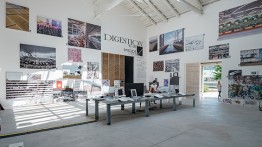Student Lecture Series | Lucia Tahan: Ghost Tortilla
Thursday, November 2, 2023, 6:30 - 8:30pm

Foodscapes, Spanish Pavilion at the 18th Venice Architecture Biennale. Photo: Pedro Pegenaute.
This event will be conducted in-person in room 315F and through Zoom.
For Zoom attendance, please register in advance here.
Ghost Tortilla is Lucia Tahan’s research contribution to Foodscapes, the Spanish Pavilion at the 2023 Venice Biennale.
Traditional dishes like Spanish tortilla (a potato-filled omelet), paella or croquettes have recently been on food delivery platforms’ marketing campaigns all over Spain. They target young people who lack the time to make these elaborate dishes at home but feel nostalgia for their family’s home-made foods. As a result, virtual restaurants that prepare only one of these dishes have started to appear. Some of them operate out of “ghost kitchens”, delivery-only kitchens in industrial buildings or opportunistically nestled in small spaces in cities.
As delivery platforms mature, new typologies and economies appear that are a departure from prior restaurant concepts, like virtual restaurants. The research project documented three ghost kitchen models in Madrid, including a newly hybrid traditional and virtual restaurant, an opportunistic kitchen nestled in a market, and a large-scale kitchen rental development.
But the phenomenon doesn’t end at the scale of the kitchen or even the city. How does the interface of an app create demands for specific types of restaurants? What global-scale landscapes and infrastructure need to exist to support the digital layer of delivery? What is the economic motivation that drives delivery platforms and where are they headed? Ghost Tortilla is a recipe that takes a transscalar approach to draw a line from the data centers in the US Midwest to the riders in Madrid, from the economics behind global ghost kitchen developers to those of the traditional restaurants — from the egg farm to the data farm.
Lucia Tahan is a Los Angeles-based architect and spatial computing designer. Her workexplores the relationship between architecture and virtual media. She regularly produces exhibitions and research about augmented reality and its relationship to the built environment.
Her research work on food delivery infrastructure is currently exhibited in the Spanish Pavilion at the 2023 Venice Architecture Biennale. Since 2021, her installation ‘Internet Syntax’ was exhibited in Madrid and Barcelona. In 2019 she was awarded the Housing the Human fellowship for research on augmented reality for domestic spaces. In 2018 she participated in the design of the Slovenian Pavilion at the Venice Biennale, where her work was also exhibited in the Spanish Pavilion. Previously, she co-founded a startup incubated by the New Museum in New York. Her built work comprises two houses in Extremadura, Spain.
Her work has been featured in museums and institutions such as The Berlage, Delft (2023), EPFL, Lausanne (2021), La Casa Encendida, Madrid (2022), Bi-City Biennale of Architecture/Urbanism Shenzhen (2020), Copenhagen Architecture Festival (2019), HKW, Berlin (2018), Istanbul Design Biennial (2018), MAXXI, Rome (2017), Lisbon Architecture Triennale (2017) or Seoul Architecture Biennale (2017), and has been published by media such as Architectural Design, El Pais, Archdaily and e-flux, as well as academic publications such as Lobby (Bartlett School of Architecture).
The in-person event is open to current Cooper Union Students, Faculty, and Staff only. The Public may attend this event through Zoom.
Located at 7 East 7th Street, between Third and Fourth Avenues




